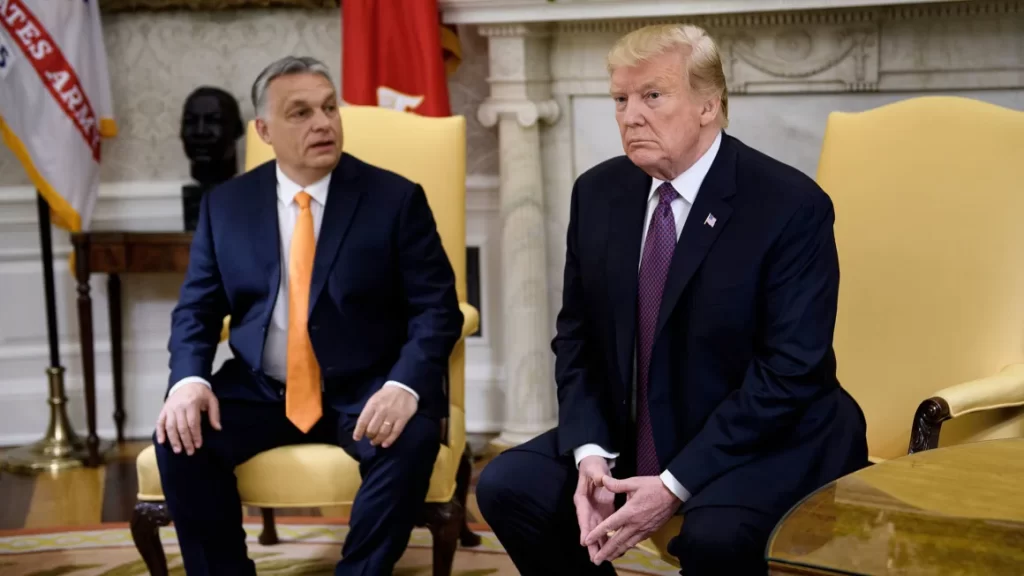While many in the GOP have embraced former President Donald Trump’s affinity for Hungary’s far-right Prime Minister Viktor Orbán, a notable faction of Senate Republicans is sounding the alarm over Hungary’s democratic decline. Despite Trump’s admiration for Orbán, which includes hosting him at Mar-a-Lago and praising his leadership, several senior Republicans are expressing significant concerns about Hungary’s political trajectory.
Recently, five Republican senators, including John Cornyn of Texas and Jerry Moran of Kansas, visited Hungary to assess the situation firsthand. In a statement, Moran voiced worries about Hungary’s deepening ties to Russia and China, as well as the erosion of democratic institutions. “Our delegation and many of our congressional colleagues are increasingly concerned by Hungary’s deepening and expanding relationship with Russia and the continued erosion of its democratic institutions,” he stated. He urged Hungary to heed the concerns of its allies regarding its engagement with China and called for closer cooperation among NATO members.
Joining Moran and Cornyn on this visit were Senator Susan Collins of Maine and Senators John Hoeven of North Dakota and John Boozman of Arkansas. Their concerns reflect broader unease within the Republican Party about Hungary’s political alignment. Orbán has been criticized for centralizing power during his 14-year tenure, leading the European Parliament to declare Hungary no longer a true democracy. His government has faced backlash for enacting anti-LGBTQ laws and extending control over the judiciary, alongside his controversial diplomatic overtures to Russia and China amidst the ongoing conflict in Ukraine.
Trump has openly endorsed Orbán, citing him as a strong leader, which he referenced during a presidential debate. “There’s nobody that’s better, smarter or a better leader than Viktor Orbán. He’s fantastic,” Trump declared. However, Senate Minority Leader Mitch McConnell has publicly opposed the rising admiration for Orbán within the party. As he prepares to step down from leadership, McConnell has intensified his critiques, emphasizing the need to counter the isolationist tendencies that have taken root in some factions of the GOP.
“I’ve spoken about Hungary’s drift into the orbit of the West’s most determined adversaries,” McConnell asserted on the Senate floor. “It’s an alarming trend, and nobody, certainly not the American conservatives who increasingly form a cult of personality around Prime Minister Viktor Orbán, can pretend not to see it.” He further condemned the idea of American leaders praising authoritarian figures, stressing that such subservience contradicts American values and interests.
During his presidency, Trump’s relationships with traditional U.S. allies, like Germany and France, were strained due to his criticisms of NATO and his isolationist rhetoric. His reluctance to fully support Ukraine following Russia’s invasion has further aggravated tensions with European allies. Some senators, like Josh Hawley of Missouri, have echoed Trump’s stance, advocating for a focus on countering Chinese influence rather than European affairs.
In contrast, other Republicans are aligning themselves more closely with traditional foreign policy. Kari Lake, a candidate for Arizona’s Senate seat, has praised Orbán and expressed admiration for his leadership after attending a Conservative Political Action Conference in Budapest. Additionally, GOP Rep. Andy Harris and Rep. Paul Gosar have lauded Orbán as a model for conservative governance.
McConnell has urged Republicans to critically assess Orbán’s actions and consider whether they align with American interests. A GOP leadership aide noted that McConnell aims to reassure allies that not all Republicans subscribe to isolationist views, highlighting the presence of “Reagan Republicans” within the party.
Amidst this internal divide, other Republican senators have reinforced the U.S. commitment to NATO. Sen. Thom Tillis of North Carolina, who co-chairs the Senate NATO Observer Group, emphasized the importance of democratic values among NATO allies. His efforts to advocate for Sweden’s accession into NATO were met with resistance from Hungarian officials, prompting him to introduce a resolution condemning Hungary’s democratic backsliding.
“Hungary is a valued NATO ally, and it is absolutely essential that they maintain their commitment to the democratic values that all NATO countries share,” Tillis stated, underlining the need for Hungary to adhere to the principles that underpin the alliance.
As the GOP navigates its relationship with Hungary and its leadership, the tension between Trump’s endorsement of Orbán and the concerns of senior Republicans underscores a critical moment in the party’s stance on foreign policy and democratic values.









